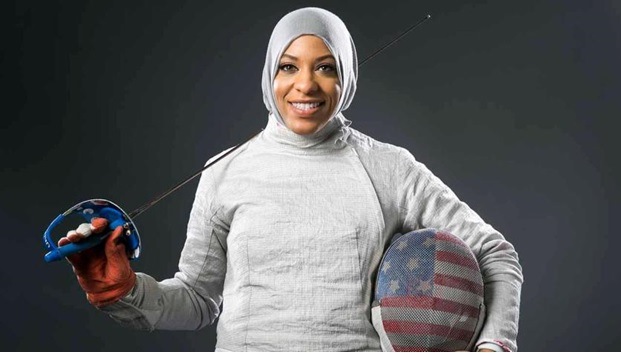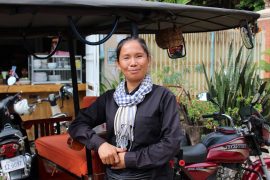Ibtihaj Muhammad is the first female Muslim-American athlete to earn a medal at the Olympics.
She was born in Maplewood, New Jersey, where she was raised by her African American Muslim parents, alongside four siblings. Her dad was a retired Newark, New Jersey police officer, and her mum an elementary school special education teacher. Ibtihaj’s parents were already blessed with four children before she was born.
Growing up, she had a special attraction for sports, but one thing stood as a limitation between her and her love for sports, which was her religious obligations that demands her modest appearance. Her religion allows for a woman to dress in a manner whereby most parts of the body are covered leaving out some functional areas for external engagements.
In accordance with her beliefs, she couldn’t participate in a number of sports that conflicted with her religious observance to dressing modestly.
Although she grew up in an athletic family she always felt out of place in some sports because she chose to dress more modestly than other girls.
Ibtihaj wanted to do more than she was already engaged in, but she was restricted to a large extent until a perfect solution was discovered; Fencing (a sport in which two competitors fight using ‘rapier-style’ swords, called the foil, winning points are made through the contact with an opponent)
Ibtihaj’s mother was instrumental in the search for the perfect sport for her daughter, one evening while driving home from work she observed a team of fencers in their long pants and hats as they practiced. Ibtihaj was 13 when they discovered fencing, and unlike other sports, fencing was an ideal opportunity to participate in sports because it allowed the use of her hijab and with this, she never felt displaced amongst her teammates.
Ibtihaj joined the fencing team and began to learn and practice the game at her Alma Mater, Columbia High School, where she graduated in 2003. She became the captain of the fencing team in her school for two years and led the team’s victory during the state championships twice.
She later joined the Peter Westbrook Foundation, a non-profit organization that introduces and teaches the sport of fencing (and life skills) to underprivileged inner-city youth in New York City. There, she met other kids from similar backgrounds and she became more zealous to pursue her decision.
In 2007 Ibtihaj graduated from the Duke University as a scholarship holder with a double major in international relations and African-American studies and a minor in Arabic.
While at Duke University, she played fencing with the school’s club and cleared All-America honors with a record of 49-8, just in her first year at the college.
At the mid-Atlantic/South Regional and 21st at the Junior Olympics, she moved to place second. The following year, she finished 11th for saber at the NCAA Championships and earned her second consecutive All-America honors.
This was just the beginning of her success record. Throughout her career, she earned numerous medals for both her team and for herself during all the events on the World Cup circuit.
In 2009, she won a national title after her new coach Akhi Spencer-El (2000U.S. Olympian) came on board.
In 2012, she was named Muslim Sportswoman of the year being the first woman to wear a hijab while competing for the United States in the Olympics. In 2014, she won the gold for her team representing the United States in Kazan, Russia.
During the Women’s Individual Sabre in the Rio de Janeiro 2016 Summer Olympics, Ibithaj won her first qualifying round but was defeated by French fencer Cécilia Berder in the second round.
Despite the loss, she continued to gain media attention as the first female Muslim-American athlete to win an Olympic medal when she took home the bronze in the team sabre event.
Ibithaj serves on the council for the U.S. Department of State’s Empowering Women and Girls through Sports Initiative, a platform that encourages girls across the globe to reach their full potential.
Her story is an inspiration to many women and young girls both in the Muslim society and the sporting sector who are restricted by their beliefs. She serves as a role model and a symbol of encouragement for other Muslim girls who are interested in sporting. Ibithaj’s story inspired the production of Barbie’s first hijab-wearing doll in November 2017.




